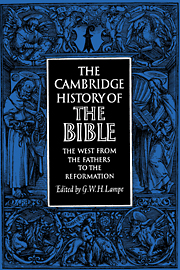Book contents
- Frontmatter
- I The Old Testament: Manuscripts, Text and Versions
- II The History of the Text and Canon of the New Testament to Jerome
- III Early Christian Book-Production: Papyri and Manuscripts
- IV Jerome
- V The Medieval History of the Latin Vulgate
- VI The Exposition and Exegesis of Scripture
- VII The ‘People's Bible’: Artists and Commentators
- VIII Bible Illustration in Medieval Manuscripts
- IX The Vernacular Scriptures
- X Erasmus in Relation to the Medieval Biblical Tradition
- Bibliography
- Notes on the Plates
- Index
- References
X - Erasmus in Relation to the Medieval Biblical Tradition
Published online by Cambridge University Press: 28 March 2008
- Frontmatter
- I The Old Testament: Manuscripts, Text and Versions
- II The History of the Text and Canon of the New Testament to Jerome
- III Early Christian Book-Production: Papyri and Manuscripts
- IV Jerome
- V The Medieval History of the Latin Vulgate
- VI The Exposition and Exegesis of Scripture
- VII The ‘People's Bible’: Artists and Commentators
- VIII Bible Illustration in Medieval Manuscripts
- IX The Vernacular Scriptures
- X Erasmus in Relation to the Medieval Biblical Tradition
- Bibliography
- Notes on the Plates
- Index
- References
Summary
Were we to take the title set for our study in any narrow sense, a single sentence would cover it completely: there is no relationship at all between Erasmus and the medieval biblical tradition. Read, for example, Miss Beryl Smalley's excellent book on The study of the Bible in the middle ages, after collating everything that Erasmus wrote on the Bible: we have the impression that Erasmus simply knew nothing whatever about all that Miss Smalley has taken for her subject-matter. Hugh of Saint-Cher and Nicholas of Lyra get only a cursory mention in the Apology to his New Testament. Though the name is not mentioned, he is probably referring to the Glossa—and that with some acerbity—in one page of the Ratio in which he denounces wrong quotations of the Fathers. And that is about all. So far as biblical studies are concerned, Erasmus's knowledge of the middle ages is pretty well limited to the dialectical use made by the later schoolmen of truncated texts, wrenched from their contexts. He acknowledges—rather distantly—Thomas Aquina's exegetical principles; but so far as traditional exegesis is concerned he applies himself closely only to the Fathers, to Jerome especially, and then more and more to the Greek Fathers. His interest very soon fixed on textual criticism of the Bible, in particular of the New Testament, as it had been re-established (rather than simply revived) by Lorenzo Valla, under the influence of Jerome and the Origen of the Hexapla. Then, on this basis, he set himself to give new life to meditation on the divine word, and the preaching of it.
- Type
- Chapter
- Information
- The Cambridge History of the Bible , pp. 492 - 506Publisher: Cambridge University PressPrint publication year: 1969
References
- 3
- Cited by

